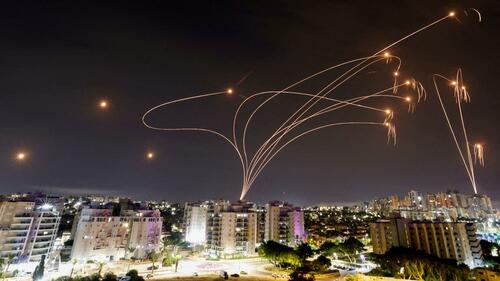
Israel has been at war on several fronts for more than a year at this point, and is rapidly expending ammo and missiles, especially as it tries to shoot down what are now dozens of projectiles daily sent from Hezbollah positions in Lebanon.
Hezbollah is estimated to have an arsenal of hundreds of thousands of rockets and drones of various sizes. Israel's formidable anti-air defense systems have been regularly engaging inbound threats, sometimes expending hundreds of interceptors a day - and this was particularly true during the Oct.1st Iranian ballistic missile attack.
Israel has long heavily relied on the United States to supply it with heavy artillery, bombs, and missiles - but now appears to be running low on interceptors amid the daily firefights.

A new Financial Times report warns that Israel's missile defense shield is being stretched thin, and that the country is more heavily relying on Washington to fill the gaps.
"Israel faces a looming shortage of interceptor missiles as it shores up air defenses to protect the country from attacks by Iran and its proxies, according to industry executives, former military officials and analysts," FT writes.
"The US is racing to help close gaps in Israel’s protective shield, announcing on Sunday the deployment of a Terminal High-Altitude Area Defense (Thaad) antimissile battery, ahead of an expected retaliatory strike from Israel on Iran that risks further regional escalation."
One analyst and former US senior defense official, Dana Stroul, stated that "Israel’s munitions issue is serious. Stroul, a pro-Israel and anti-Iran hawk, has described that "If Iran responds to an Israel attack [with a massive air strike campaign], and Hizbollah joins in too, Israel air defenses will be stretched."
She underscored the limitations in such a scenario for the Pentagon's stockpiles: "The US can’t continue supplying Ukraine and Israel at the same pace. We are reaching a tipping point."
We've highlighted before that Israel likely cannot sustain wars on multiple fronts without steady support and weapons shipments from the US. As conflict - and Washington involvement - from Eastern Europe to the Middle East escalates, it remains that the only 'winners' are the major US defense firms:
Boaz Levy, CEO of Israel Aerospace Industries which produces missile interceptors, adds: "Some of our lines are working 24 hours, seven days a week. Our goal is to meet all our obligations."
Palestinian media has meanwhile taken note...
“Supply constraints” and the demands of war have left the Israeli military “relying on the US to fill the gaps in protective shields”.
— Quds News Network (@QudsNen) October 15, 2024
In recent days, the US announced it is deploying the anti-missile system THAAD to Israel as it continues to provide “ironclad” support for its… pic.twitter.com/Ngt2iGXKPG
During two separate rounds of Iranian missile attacks on Israel of the past year, the US has deployed warships and fighter jets to assist Israel in shooting down inbound projectiles. But systems like the Iron Dome, Arrow, and David's Sling remain vital to Israel's daily defense, especially given Hezbollah's ramped-up attacks on the north of late. The US has now sent the Army's THAAD missile defense system.
Will the US ever cut off Israel? It is unlikely, given that both sides of the aisle tend to be led by "Israel firsters" - and sadly the presidential race is no different.
Israel has been at war on several fronts for more than a year at this point, and is rapidly expending ammo and missiles, especially as it tries to shoot down what are now dozens of projectiles daily sent from Hezbollah positions in Lebanon.
Hezbollah is estimated to have an arsenal of hundreds of thousands of rockets and drones of various sizes. Israel’s formidable anti-air defense systems have been regularly engaging inbound threats, sometimes expending hundreds of interceptors a day – and this was particularly true during the Oct.1st Iranian ballistic missile attack.
Israel has long heavily relied on the United States to supply it with heavy artillery, bombs, and missiles – but now appears to be running low on interceptors amid the daily firefights.

A new Financial Times report warns that Israel’s missile defense shield is being stretched thin, and that the country is more heavily relying on Washington to fill the gaps.
“Israel faces a looming shortage of interceptor missiles as it shores up air defenses to protect the country from attacks by Iran and its proxies, according to industry executives, former military officials and analysts,” FT writes.
“The US is racing to help close gaps in Israel’s protective shield, announcing on Sunday the deployment of a Terminal High-Altitude Area Defense (Thaad) antimissile battery, ahead of an expected retaliatory strike from Israel on Iran that risks further regional escalation.”
One analyst and former US senior defense official, Dana Stroul, stated that “Israel’s munitions issue is serious. Stroul, a pro-Israel and anti-Iran hawk, has described that “If Iran responds to an Israel attack [with a massive air strike campaign], and Hizbollah joins in too, Israel air defenses will be stretched.”
She underscored the limitations in such a scenario for the Pentagon’s stockpiles: “The US can’t continue supplying Ukraine and Israel at the same pace. We are reaching a tipping point.”
We’ve highlighted before that Israel likely cannot sustain wars on multiple fronts without steady support and weapons shipments from the US. As conflict – and Washington involvement – from Eastern Europe to the Middle East escalates, it remains that the only ‘winners’ are the major US defense firms:
Boaz Levy, CEO of Israel Aerospace Industries which produces missile interceptors, adds: “Some of our lines are working 24 hours, seven days a week. Our goal is to meet all our obligations.”
Palestinian media has meanwhile taken note…
“Supply constraints” and the demands of war have left the Israeli military “relying on the US to fill the gaps in protective shields”.
In recent days, the US announced it is deploying the anti-missile system THAAD to Israel as it continues to provide “ironclad” support for its… pic.twitter.com/Ngt2iGXKPG
— Quds News Network (@QudsNen) October 15, 2024
During two separate rounds of Iranian missile attacks on Israel of the past year, the US has deployed warships and fighter jets to assist Israel in shooting down inbound projectiles. But systems like the Iron Dome, Arrow, and David’s Sling remain vital to Israel’s daily defense, especially given Hezbollah’s ramped-up attacks on the north of late. The US has now sent the Army’s THAAD missile defense system.
Will the US ever cut off Israel? It is unlikely, given that both sides of the aisle tend to be led by “Israel firsters” – and sadly the presidential race is no different.
Loading…





